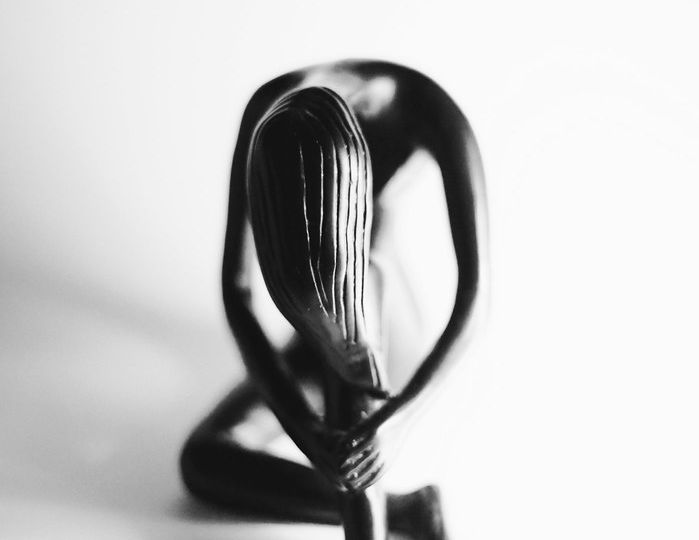
The canvas of a city is experiential – from the walls and windows that bear stories, to the grey and inky streets they get spilled into. As city-dwellers and storytellers, to be visible is a necessity, and as state subjects, what is necessary is also negotiable. In what ways and for whom negotiations matter is a question of gender; gender as display, as culture, carving a presence in the city. Italicised, since that visuality is a slant or an aberration, the world in straight lines fails to recognize me in all my splendour; being a womxn, what is revealed, is recognised. It is a defence of aesthetics, the image I present as a site of pleasure. Pleasure means a feeling of satisfaction, maybe in a moment, fleeting—remembered in memories, relived with pride. My city thrives in the intimacy of ghost-quiet nights, like a dream unspoken, unrevealed. Crouched in silence, I cook in a cauldron the sweet and savoury notes of pleasure. Pleasure, in the context of the private, defines the parlance of sexual satisfaction. As a womxn, the private is also the public: how I present and play with my gender, is a way of seeking validation of who I am.
I moor the metaphorical boat, somewhere closer, where it is not swept by the tides, but is anchored to the shore, less turbulent and fragile, in the warmth of my boudoir. Sex becomes lively, steamy and perfumed, a search for tenderness in each other’s skin, a spark of freedom. I engage in sex not merely out of an urge, but for the theatrical thrill, it promises. I wish to be dressed, and not clothed; to the mascara and the rich velvety lipstick, I owe my allegiance; the silver danglers that glimmer like chandeliers carve a halo around me. These are not ordinary affairs to me, for unlike cis-women, the poetry with which they carry gender expression in the public, is one I have to struggle to write and reveal. A saree-clad womxn like me is a stranger in the eyes of the city – I become exotic and erotic. On the one hand, it is a colonised existence; on the other, a rebellious reclaiming of space. In many ways, I appear as an image or an icon, I recognise the kink that makes me a womxn. Appearance isn’t the air I breathe, but an Act I prepare for.
Act as I say, isn’t about acting, and those terms ought not to be married. Act in the context that I write in is a political action. My personal pulsates within the political, and to vacate the political would be to extinguish the personal. The desire with which I hold the two reflects my claim for a place in the republic. To care for that claim is to make my body visible, by leaps and bounds, visibility through the material as it confronts the texture of gender, and is historically and culturally informed by its presence, trails, and echoes. Those confrontations are tactile; there is a stress on the skin and how it becomes the visual and the vulnerable. And to feel unburdened by it, or unmoved by its force, is to derive an innate pleasure in self-care. For the care of self for a womxn is not a choice, but sustenance, an assertion of life.
Pleasure as a performance, a becoming rather than just being. Because being a womxn falls short of satisfying the grammar that envelops my existence. Simone De Beauvoir’s words “One is not born, but rather, becomes a woman”, feel more flirty than a dictum, and feminists got it all wrong. One often dismisses the sheer tenacity of pleasure, how becoming is about the anxiety of presentation, the timing and pause of each gesture – the body in performance and as a performance. To me as a trans person, these markers delineate the definitions of gender and sexuality. Every morning before I step out, there is an overwhelming urge to become the image; any fragment of my assigned gender at birth is a faux pas. In writing the language of a womxn in the skin that meets surveillance night and day, the labour I invest (what we call passing) is a radical owning of pleasure. The ways I craft myself in front of the mirror lull me to a fleeting sensation of being happy and safe; I feel I belong, and am acknowledged.
Becoming isn’t just about that powder finish, the soft porn, the seamless experience; it is an exercise of power, to be in control even when defenseless. I am the excess (sights, smells, and the lovely silk) because I can only express the fullest possibility of my felt gender through excess. Excess is pleasure, and pleasure is not just an emotion, it latches on to you like a love that lingers in a dystopic world. When storms brew and clouds come to a halt, pleasure is those raindrops on roses. Pleasure is my song that calms dysphoria, within it is woven the fabric of sex and sexuality, and to dismiss those from feminist revolutions will be to dismiss my body and the colours that paint the setting sun, the flavours that taste of existence. As feminists, we mustn’t scorn the politics of pleasure, it holds the comfort and violence of a home we are both adored in and alienated from. As feminists, we must be embraced by the arms of pleasure, for they make life less boring and precarious; we must bring in conversations where womxn can fearlessly reveal their body, not whisper in bedrooms and through text messages, but scream and pour out our hearts, the love and the loss we carry, the lives we desire, and the power we wield and aspire to.
Featured image credit: Sami AlHumaid